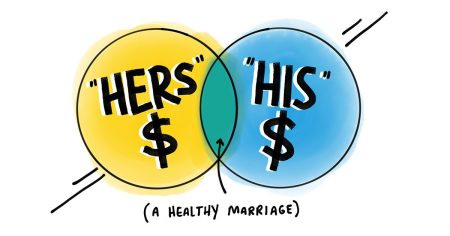Generosity is super important to me. I believe it goes hand in hand with contentment and helps us avoid this instant gratification lifestyle that’s just so easy to fall into these days.
And one of the many ways to be generous with your money is by giving tithes and offerings. But what does tithing actually mean, and how much should you be tithing? I’ll be answering those tithing questions—and more!
What Is Tithing?
A tithe is a portion (10%) of your income given to your local church.
Because the custom of tithing is biblical, many Christians and Jews practice it as part of their faith. In fact, the Bible explains that tithing is an important part of faith for those who follow God and that your tithe should be money you set aside first.
What Does the Bible Say About Tithing?
The idea of tithing—and specifically giving 10%—comes straight from Scripture. Here are a few key Bible verses about tithing:
Leviticus 27:30 (TLB): “A tenth of the produce of the land, whether grain or fruit, is the Lord’s, and is holy.”
Proverbs 3:9 (NIV): “Honor the LORD with your wealth, with the firstfruits of all your crops.”
Genesis 28:20–22 (NIV): “Then Jacob made a vow, saying, ‘If God will be with me and will watch over me on this journey I am taking and will give me food to eat and clothes to wear so that I return safely to my father’s household, then the LORD will be my God and this stone that I have set up as a pillar will be God’s house, and of all that you give me I will give you a tenth.’”
Nehemiah 10:35 (NIV): “We also assume responsibility for bringing to the house of the LORD each year the firstfruits of our crops and of every fruit tree.”
Malachi 3:10 (NIV): “‘Bring the whole tithe into the storehouse, that there may be food in my house. Test me in this,’ says the Lord Almighty, ‘and see if I will not throw open the floodgates of heaven and pour out so much blessing that there will not be room enough to store it.’”
Don’t let all the gardening metaphors throw you off. What these verses are really saying is that you should give a portion (specifically a tenth) of whatever you make back to God. And that word firstfruits is just a biblical way of saying that you should give first—before you do anything else with your money.
That’s why giving should be the first category in your budget—because when you tithe before making a plan with the rest of your money, you’re making it a priority instead of an afterthought. You’re giving your firstfruits instead of your leftovers.
What’s the Difference Between Tithes and Offerings?
I know tithes and offerings are grouped together a lot, but they’re actually not the same thing.
A tithe is a specific amount (10% of your income) that you give first, and an offering is anything extra that you give beyond that.
Start budgeting with EveryDollar today!
So, after you’ve tithed and paid all your bills and expenses for the month, you can use any extra money in your budget to give even more! This can look like giving a cash offering to your church above and beyond your normal tithe, giving money to a charity you support, giving to a friend in need, or giving your time and skills by volunteering.
Why Should I Tithe?
The Bible tells us that tithing is a way to show that we trust God with our lives and our finances. Because here’s the deal: Tithing isn’t for God’s benefit. He doesn’t need our money. Instead, tithing is meant for our benefit, because sacrificing a portion of our income reminds us to rely on God to meet our needs. Plus, it makes us more aware of the needs of others.
In fact, supporting the needs of pastors and the work of the local church is one of the main reasons behind tithing. When you give tithes and offerings, it helps your local church actively be the church by helping others.
Giving encourages a grateful and generous spirit and can help steer us away from greed and discontent. Plus, I always say that being outrageously generous is the most fun you’ll ever have with money! And it starts with tithing.
Do Christians Have to Tithe?
While tithing 10% of your income is biblical, you’re not required to tithe to be a Christian. And you’re not a bad Christian if you don’t tithe. Thankfully, God loves us when we give and when we don’t give.
And that’s key here: We don’t have to tithe to earn God’s love—because we already have it. In Matthew 23:23, Jesus warns against focusing too much on the rules of tithing without paying attention to the more important things like justice, mercy and faithfulness. This isn’t about a rule. This is about your heart.
Bottom line? You should be giving in some way. But tithing is more of a spiritual topic than a financial one. It’s about living with the attitude that we’ve been blessed to be a blessing. In fact, 2 Corinthians 9:7 (NIV) says, “Each of you should give what you have decided in your heart to give, not reluctantly or under compulsion, for God loves a cheerful giver.”
7 Common Questions About Tithing
1. If I don’t go to church, should I still donate 10% of my income?
If we’re going by the definition here, giving 10% of your income to anything other than the local church isn’t technically a tithe—it’s just a nice gift. But I’d encourage anyone to live generously. And there are plenty of ministries and organizations that are doing great work and could benefit from your gifts.
2. Should I tithe while trying to pay off debt?
If you’re in debt, tithing should still be a priority. Listen, I know it’s tempting to throw that money at your debt, but the discipline and faith that tithing brings are so worth it. Even while you’re paying down debt, you can still have an attitude of generosity.
Now, there are extreme situations where people literally cannot cover their Four Walls (aka the basic expenses for survival). But most people, even if things are tight, can cover their bills and still tithe.
If that 10% seems out of reach, you might need to do a lifestyle check. Look at your budget and find ways to cut back on spending. It might mean limiting some of your fun money, packing your lunch instead of eating out every day, brewing your own coffee, or buying generic products—but it is possible to tithe throughout your whole debt-free journey.
Now, you should hold off on offerings (those extra gifts) while you’re paying off debt and put all your extra money toward your debt snowball. But that’s not for forever. Soon, you’ll be out of debt—and you’ll be free to give as generously as you want to!
3. Do I give 10% of my income before or after taxes? And do I add income from side hustles?
Honestly, whether you tithe from your gross pay (before taxes) or your take-home pay (after taxes) is totally up to you. The point here is that you’re giving 10% of your income.
Dave Ramsey gives off the top of his taxable income—and I do too! But the true heart is this: Just give and be a giver. It’s about changing your spirit and being intentionally generous.
As for your side hustle, the 10% you give should come from your entire income. So, if you have a part-time job on the weekends that brings in $300 extra each month, add that amount to your total monthly income and tithe $30 of it.
4. Is it right to count my church tithe on my tax returns?
Even though tithing to your church is a matter of the heart, taking a tax deduction doesn’t change the value of your generous gift. Not at all! The Bible tells us to be good stewards of our money, so if taking the deduction helps you manage the other 90% of your money better, then go for it.
5. Should I tithe 10% of my tax return money?
If you get an income tax refund, remember that’s money you’ve already tithed on during the year—although, you’re totally welcome to give some or all of it back to the Lord as even more thanks for His blessings!
But sidenote, tax refunds are just interest-free loans to the government, so you should really look into adjusting your withholdings if you get big tax refunds each year.
6. Should I tithe on gifts?
There’s no scripture that says you have to tithe on money you receive as a gift or inheritance, but that doesn’t mean you can’t. Really, this one is a decision between you and God.
7. How should I increase my giving when I start making more money?
When things are going well and you start making more money than you need, that’s a great opportunity to give above and beyond your tithe. Regular tithers are often already doing this—lots of them give above 10%.1 Obviously, that generous spirit doesn’t have to stick to just a tenth of your income!
After you’re debt-free, depending on what Baby Step you’re on, that extra money you’re making can go toward giving more in offerings, upping your investments, or spending some fun money. Just make sure it’s all in the budget: the giving, saving and spending. All of it!
When you’re looking for extra ways to give, you can ask friends if they know of anyone in need and watch for opportunities to give. Trust me, when you’re intentional about looking for ways to be generous—you’ll find them.
I said it before, and I’ll say it again: Giving is the most fun you can have with your money!
How to Tithe
1. Pray.
Remember: Tithing is more of a heart issue than a money issue. If you’re struggling with the idea of tithing or giving, spend some time with God, asking Him to give you wisdom and show you ways that you can help others—or even just be more generous. Even if giving doesn’t come naturally, prayer can help soften our hearts and refocus our intentions.
2. Try online giving.
Many churches have tried to make tithing as easy as possible. If you go to church, they may have a way to give online (or through an app). And many churches even let you set up automatic withdrawals each month, which is great—especially if you have a regular income.
Maybe you prefer writing a check or giving cash because it’s a physical reminder of the money you’re taking out of your wallet and giving away. It really doesn’t matter if you’re giving online or in person, as long as you’re giving!
3. Do a monthly budget.
It’s hard to know how much you can give if you have no clue where your money’s going. You need a plan. You need a monthly budget!
Before the month begins, create your own zero-based budget (where your income minus your expenses equals zero). This is how you give every dollar a job—and it’s super easy when you budget with EveryDollar!
Start with immediately putting aside 10% of your income for tithing, then budget for savings (depending on what Baby Step you’re on).
After that, budget for your Four Walls (food, utilities, shelter and transportation) and other necessities like insurance and day care. That way, you know exactly how much you can spend on things like streaming services, entertainment and those fun Target runs. You can even create a Random Giving budget line for when you want to help someone in the spur of the moment.
Budgeting often takes at least three months to get the hang of. And tithing, if it isn’t a habit yet, can take some getting used to as well. As long as you’re taking steps to be more generous with what you have, you’re on the right track.
And that’s always the main takeaway: to live more generously! Not to check a box, meet a rule, or earn God’s love—but to share your blessings and God’s love with others.
Read the full article here










